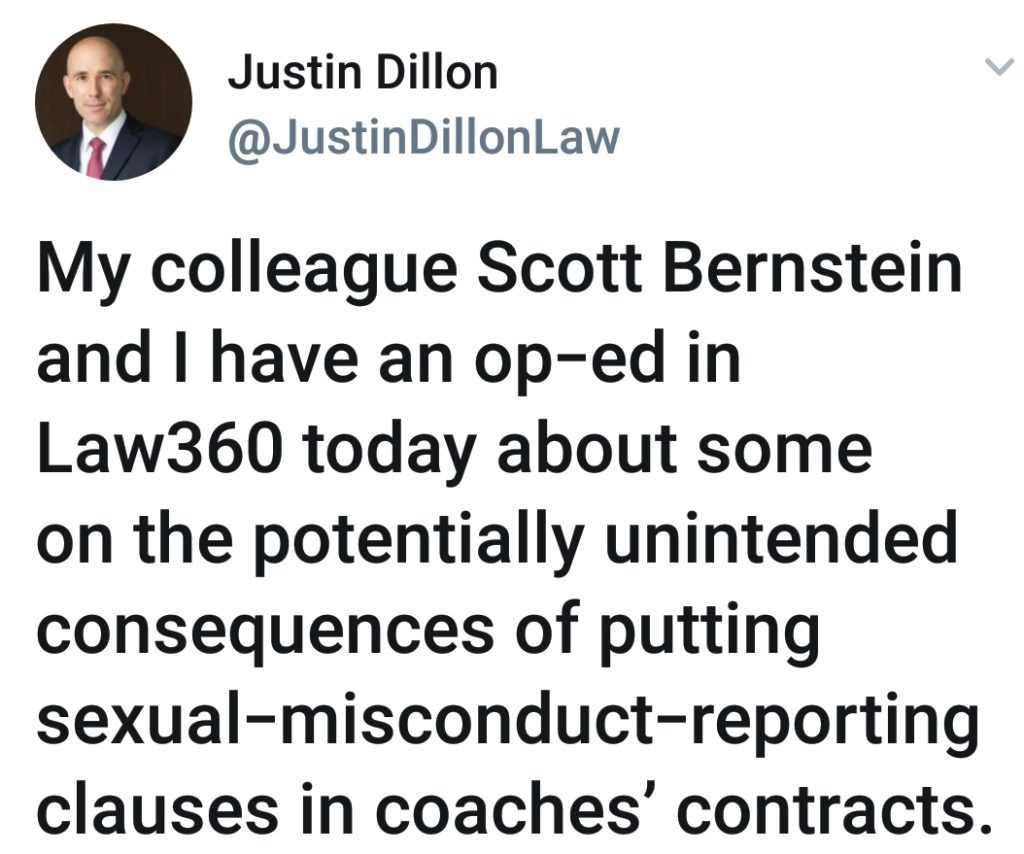 The scandal embroiling head football coach Urban Meyer at The Ohio State University took on a concerning new dimension recently, when media coverage revealed that last April, Ohio State added language to Meyer’s contract requiring him to report any known violations of the school’s sexual misconduct policy. The clause Ohio State inserted into Urban Meyer’s contract when it gave him an extension and $1.2 million raise in April required him to “promptly report to Ohio State’s Title IX coordinator for athletics any known violations of Ohio State’s sexual misconduct policy.” That now appears prescient — the school is currently investigating Meyer’s failure to report domestic abuse allegations against one of his assistant coaches. If Meyer breached that clause, the university may not have to pay the $38.1 million it would owe him if it fired him without cause. Ohio State isn’t the only school that has added this sort of clause to coaching contracts. So has Texas A&M. This trend is seemingly a reaction to the sexual assault scandal at Baylor University. No school wants to be the next Baylor. And some schools apparently believe that these new clauses are a way to avoid that fate. As attorneys who have represented scores of students nationwide in sexual misconduct investigations, however, we are concerned that these clauses will do a lot more harm than good, by turning innocent college students into alleged perpetrators of sexual misconduct. That’s because there’s a wide gap between how schools define “sexual misconduct” and what people typically consider “sexual misconduct.” Schools, to the surprise of no one except people who work at schools, sometimes don’t have a lot of common sense. But when schools deputize coaches to report on their players — or face termination without severance — there will be a lot more of these sorts of cases: technical violations of an overly broad policy that ordinarily wouldn’t turn into a full-fledged sexual misconduct investigation. The problem isn’t the noble motivation of these new clauses — it’s that schools define “sexual assault” and other forms of “sexual misconduct” too broadly. Law360 -Coach Contract Op-Ed By Bernstein and Dillon
The scandal embroiling head football coach Urban Meyer at The Ohio State University took on a concerning new dimension recently, when media coverage revealed that last April, Ohio State added language to Meyer’s contract requiring him to report any known violations of the school’s sexual misconduct policy. The clause Ohio State inserted into Urban Meyer’s contract when it gave him an extension and $1.2 million raise in April required him to “promptly report to Ohio State’s Title IX coordinator for athletics any known violations of Ohio State’s sexual misconduct policy.” That now appears prescient — the school is currently investigating Meyer’s failure to report domestic abuse allegations against one of his assistant coaches. If Meyer breached that clause, the university may not have to pay the $38.1 million it would owe him if it fired him without cause. Ohio State isn’t the only school that has added this sort of clause to coaching contracts. So has Texas A&M. This trend is seemingly a reaction to the sexual assault scandal at Baylor University. No school wants to be the next Baylor. And some schools apparently believe that these new clauses are a way to avoid that fate. As attorneys who have represented scores of students nationwide in sexual misconduct investigations, however, we are concerned that these clauses will do a lot more harm than good, by turning innocent college students into alleged perpetrators of sexual misconduct. That’s because there’s a wide gap between how schools define “sexual misconduct” and what people typically consider “sexual misconduct.” Schools, to the surprise of no one except people who work at schools, sometimes don’t have a lot of common sense. But when schools deputize coaches to report on their players — or face termination without severance — there will be a lot more of these sorts of cases: technical violations of an overly broad policy that ordinarily wouldn’t turn into a full-fledged sexual misconduct investigation. The problem isn’t the noble motivation of these new clauses — it’s that schools define “sexual assault” and other forms of “sexual misconduct” too broadly. Law360 -Coach Contract Op-Ed By Bernstein and Dillon
The scandal embroiling head football coach Urban Meyer at The Ohio State University took on a concerning new dimension recently, when media coverage revealed that last April, Ohio State added language to Meyer’s contract requiring him to report any known violations of the school’s sexual misconduct policy. The clause Ohio State inserted into Urban Meyer’s contract when it gave him an extension and $1.2 million raise in April required him to “promptly report to Ohio State’s Title IX coordinator for athletics any known violations of Ohio State’s sexual misconduct policy.” That now appears prescient — the school is currently investigating Meyer’s failure to report domestic abuse allegations against one of his assistant coaches. If Meyer breached that clause, the university may not have to pay the $38.1 million it would owe him if it fired him without cause. Ohio State isn’t the only school that has added this sort of clause to coaching contracts. So has Texas A&M. This trend is seemingly a reaction to the sexual assault scandal at Baylor University. No school wants to be the next Baylor. And some schools apparently believe that these new clauses are a way to avoid that fate. As attorneys who have represented scores of students nationwide in sexual misconduct investigations, however, we are concerned that these clauses will do a lot more harm than good, by turning innocent college students into alleged perpetrators of sexual misconduct. That’s because there’s a wide gap between how schools define “sexual misconduct” and what people typically consider “sexual misconduct.” Schools, to the surprise of no one except people who work at schools, sometimes don’t have a lot of common sense. But when schools deputize coaches to report on their players — or face termination without severance — there will be a lot more of these sorts of cases: technical violations of an overly broad policy that ordinarily wouldn’t turn into a full-fledged sexual misconduct investigation. The problem isn’t the noble motivation of these new clauses — it’s that schools define “sexual assault” and other forms of “sexual misconduct” too broadly. Law360 -Coach Contract Op-Ed By Bernstein and Dillon

